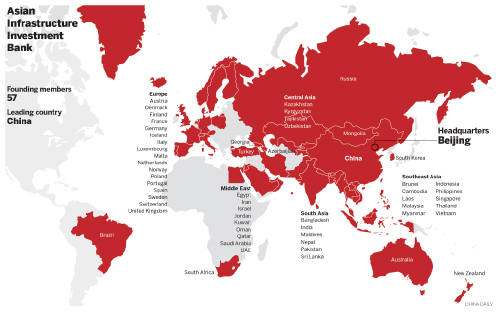AIIB to operate in transparent way
 0 Comment(s)
0 Comment(s) Print
Print E-mail China Daily, April 16, 2015
E-mail China Daily, April 16, 2015

Financial transparency, corporate governance and high standards in top management skills will be the cornerstones of the Asian Infrastructure Investment Bank.
Already 57 countries have joined the AIIB with South Korea, the United Kingdom, Australia, France, Germany and Italy all signing up as founding members.
In keeping with such a large organization, Jin Liqun, chairman of the Multilateral Interim Secretariat of the AIIB, told a forum in Singapore on Saturday that the AIIB will adopt a "21st century management" structure.
This will involve a "core group of professionals" running the bank, where the top management will be appointed on ability and not political connections.
"The AIIB is a bank, not a political organization or political alliance," said Jin. "This will guarantee that it will operate in a transparent way."
Jin said that the AIIB will have strict parameters and will strive to be graft-free as well as transparent in all dealings and transactions. On several occasions he has stressed that the AIIB will have "zero tolerance toward corruption". The motto of the bank set by him is "lean, clean and green".
Jin also assured his Singaporean audience that China will not dominate the key roles inside the AIIB. "Leadership is not a privilege," he said. "It's an obligation."
Jin's team has been in contact with some leading experts. They include Natalie Lichtenstein, who has retired from the World Bank after 30 years as a senior lawyer.
Shaukat Aziz, former prime minister of Pakistan, said that precisely because the AIIB is starting from "ground zero", it could avoid being "a hostage to history" and copying the mistakes made by established institutions.
When asked about whether the AIIB will adhere to the "best practices" of the World Bank and the Asian Development Bank, Shi Guangyao, vice-minister of finance, said: "There is no 'best practice' but 'better practices'. China will work with other parties to build the AIIB into a professional, efficient infrastructure investment platform."
For example, the bank will likely have a nonresident board of directors, versus the resident board of directors commonly adopted by the World Bank and the ADB.
The board of directors will be in the second layer of the governing structure. The top layer, the board of governors, will elect a board of directors, which will determine budgets and projects.
Five key issues to watch
・ Who will be the first president of the bank?
One prominent contender is Jin Liqun, the head of the Multilateral Interim Secretariat of the AIIB.
Jin, born in 1949, has an impressive resume. After graduation from Beijing Foreign Studies University with a major in English, he joined the Ministry of Finance. In the 1980s he was dispatched to the World Bank Group as an alternative executive director for China. He then became the vice-minister of finance. He was appointed as vice-president of the Asian Development Bank in 2003.
He has been described by colleagues as "an experienced, savvy, pragmatic guy" who did much of the backdoor negotiating that persuaded key economies including the United Kingdom, Germany, Australia and South Korea to join the new bank.
What is the shareholding structure and will China waive veto power?
The AIIB has made it clear that GDP will be the basic criterion in determining share allocations among members, and when allocating shares, it will treat Asian nations and non-Asian nations differently. Asian nations will hold a combined stake of 75 to 80 percent, Caijing magazine has reported.
Under this arrangement, China will not have a 50 percent share in the new bank. By comparison, the United States only has a 17.4 percent share in the International Monetary Fund but retains veto power. There have been no indications that China will follow that model.
The Wall Street Journal has reported that Chinese negotiators persuaded key European nations to break rank with Washington and become founding members of the new bank by promising to relinquish China's veto power. Commenting on the report, the Finance Ministry said: "As the number of participants grows, it is natural that every country's share in the organization will decline. It is pointless to discuss the issue before the articles have been formulated."
・ How will seats on the board of directors be allocated?
Some media reports have said that one reason major European nations rushed to join the AIIB was that they were offered seats by appointment. Caijing magazine previously reported that, as with shareholdings, GDP will be the key determinant, although balance among geographic regions will also be considered.
・ Will the yuan be included in the AIIB's currency basket?
Analysts have said that doing so would give a big boost to the yuan's internationalization. The South China Morning Post, citing unidentified think tank sources, reported on Tuesday that China will push for the yuan to be included in the basket of currencies used for AIIB lending and repayment.
The newspaper added that China will encourage the AIIB and Silk Road Fund to form special-currency funds and make yuan-denominated loans. The dollar is also likely to be included as a settlement currency.
・ Will the US and Japan join?
The two countries are the only major economies that do not appear on the final list of founding members. It is possible that they will eventually join. Japan is "actively examining" the issue and its finance ministry has conducted a study of the matter, the Kyodo News Agency reported.
Japanese Finance Minister Taro Aso said he will discuss the issue with his Chinese counterpart during a bilateral dialogue in June. He said that China first needs to establish terms for governance of the AIIB.
Canada is also studying the possibility of joining the AIIB.






Go to Forum >>0 Comment(s)